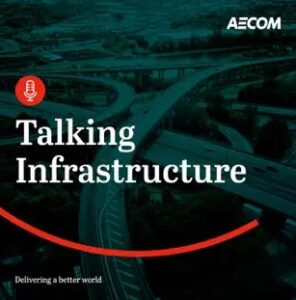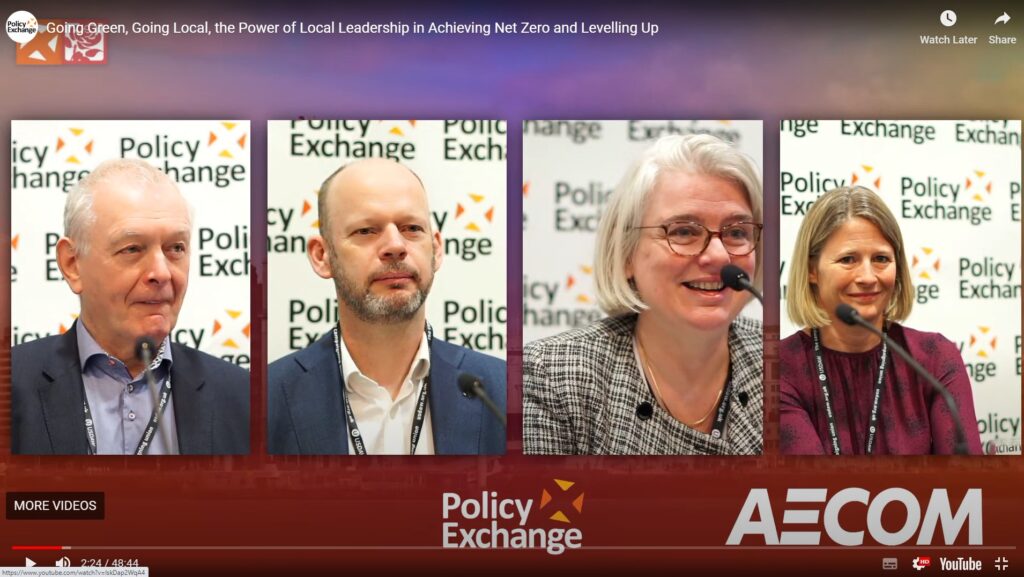Stability the key for levelling up and achieving net zero
Policymaking for the long term essential for driving private investment in local projects that support green growth, according to an AECOM-sponsored panel at the UK’s Labour Party Conference.
A stable and predictable long-term policy framework is key to the delivery of local economic development that can achieve the twin aims of levelling up and achieving net zero targets.
That was the conclusion of an expert panel, ´Going Green, Going Local: The Power of Local Leadership in Net Zero and Levelling Up´, convened by the Policy Exchange thinktank at the Labour Party Conference in Liverpool. The panel – sponsored by AECOM – also pointed to investment in technology and innovation, as well as addressing skills shortages, as crucial elements for local government to target in its drive for sustainable and green economic growth.

The panel, chaired by Ruth Kelly, Senior Fellow at Policy Exchange, explored the potential for local government to drive investment in partnership with the private sector in a rapidly changing policy environment, following the government’s recent announcement of low tax Investment Zones.
Jamie Driscoll, Mayor of the North of Tyne Combined Authority, argued that ensuring a reasonable return on investment rather than tax breaks was key to decision-making among investors keen to fund green projects and who typically had a horizon of ten to 30 years.
“What businesses want is stability. And if we want the large institutional investors to start investing hundreds of millions of pounds, they are going to want to be sure theyre going to get it back at the end,” he said.

Secure pipeline key to achieving net zero
Helena Rivers, Director for Estate Decarbonisation, Buildings and Places at AECOM, agreed, saying that developing constructive public-private partnerships is critical to decarbonising our urban areas.
“It´s all about those long-term local policies. One of the key advantages of the mayoral system is that you can build real momentum around a particular region and work with the private sector to attract that finance because there´s a clear pathway and solid pipeline,” she said, drawing on AECOM’s heat zoning work for Greater Manchester Combined Authority (GMCA).
Infrastructure as a catalyst for green growth
The reinstating in 2023 of passenger services on the Northumberland railway line – an AECOM project – was cited as an example of infrastructure as a catalyst for local green growth. Running from rural Ashington to Newcastle, it will bring green economic activity and much better connectivity to deprived former mining communities.
“We are redeveloping that economic corridor with a masterplan. We´re putting £10m in that will lever another £130m. And that´s about factory sites and housing and the green infrastructure that is a railway line,” said Driscoll.
Long-term investment in innovation and technology
Across the Pennines, the GMCA is addressing levelling up and net zero in three of its most deprived areas – Rochdale, Bury and Oldham – with the creation of the Atom Valley Mayoral Development Zone, another strategic public-private partnership.
Paul Ormerod, economist, and Chair of the Atom Valley project, said technology and innovation underpinned this strategy to deliver success in both levelling up and net zero within Greater Manchester, and beyond.
“The green revolution will have to be delivered by technology and intelligent machines, not through the price mechanism. Net zero can only be delivered in that way.”
He warned, however, that skills shortages could restrict progress, a point echoed by all the guests.
Strategic planning and stability the way forward
Despite current economic uncertainty and volatile political environment, there remains optimism that funds are available for investment in projects that can deliver on the promises of levelling up and net zero. The clear view of the panel was that the best route to achieving this lies in establishing strong local partnerships based on a stable long-term policy framework.






